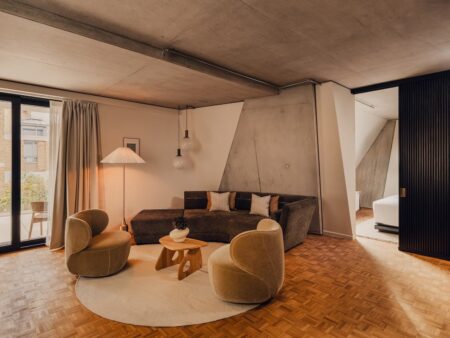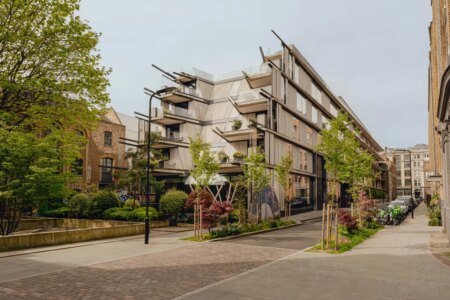Are older gay people being expected to go back into the closet when they go into residential car facilities in their later years? That’s the concern of many Dutch gay elders who worry about losing their identities as they submit to healthcare or social care regimes not designed specifically for them.
Manon Linschoten, project leader at Roze 50+, highlights that healthcare settings often appear tailored to heterosexual norms, with initial patient assessments typically presuming opposite-sex partnerships. This can leave LGBTQ+ elders feeling unrecognised and isolated within spaces where acceptance should be paramount.
In response to these challenges, various initiatives have been established, most notably the Roze Loper (Pink Ribbon) certification introduced in 2010. Facilities awarded this certificate demonstrate a commitment to recognising and supporting sexual and gender diversity. To get the certificate, these institutions must put in place comprehensive policies and practices that ensure inclusivity, engaging everyone from management to volunteers in the process. Such efforts aim to create safe environments where elderly LGBTQ+ members feel seen and valued. Care homes like Cleijenborch, part of the Stichting Ouderenzorg Noord-Beveland, have excelled in this regard, focusing on avoiding assumptions about patients’ sexual orientations during initial engagements.
Despite advancements, incidents revealing the continuing need for education and dialogue persist, even within certified facilities. A recent event at a care home in the Haarlem area, during which a patient dismissed a drag show as ‘gay propaganda’, shows there is still some way to go to genuine acceptance. As Marjet Bos, a 73-year-old woman in a same-sex relationship, said, ‘Everyone is equal, but not identical’.
Another way forward is with senior homes dedicated to the LGBTQ+ community as well as events organised by Senior Pride, which are designed to elevate the visibility of sexual and gender diversity among seniors. These events, such as the Senior Pride Concert and Pink Brunch, aim to foster an environment where older LGBTQ+ individuals feel celebrated and valued.
The push for inclusivity in care settings has proven vital, with research indicating that residents in Roze Loper-certified facilities report feeling significantly more accepted and safe in their sexual and gender identities. According to Movisie, a coalition aimed at fostering social acceptance, the Roze Loper certification not only meets immediate needs but also encourages ongoing efforts to monitor inclusivity, ensuring these initiatives are not simply one-time measures but part of a sustained commitment to equality.
[](https://www.movisie.nl/artikel/roze-loper-helpt-roze-ouderen-kiezen-lhbt-vriendelijke-zorg)[](https://www.movisie.nl/tool/aandacht-lhbt-ouderen-zorginstellingen)
Source: Noah Wire Services
- https://www.31mag.nl/non-inclusive-anziani-lgbtiq-trovano-difficolta-nelle-case-di-riposo/ – Please view link – unable to able to access data
- https://www.amsta.nl/zorg/rozezorg – Amsta offers inclusive care for the LGBTQ+ community, with all their nursing homes and care centres holding the Roze Loper certificate. They also introduced Rozeneiland, a housing facility for LGBTQ+ seniors, ensuring they can live authentically. Amsta’s commitment includes training staff to recognise and respect diversity among patients, fostering an environment where LGBTQ+ individuals feel accepted and visible.
- https://pride.amsterdam/en/commissions/senior-pride/ – Senior Pride is dedicated to making sexual and gender diversity among seniors visible and discussable. They organise events like the Senior Pride Concert and the Pink Brunch, aiming to ensure that elderly LGBTQ+ individuals feel seen, acknowledged, and appreciated. Their mission is to create a future where everyone can be themselves, regardless of age, gender, or sexual orientation.
- https://rozezorg.nl/ – RozeZorg.nl promotes the Roze Loper certificate, an official quality mark awarded to care and welfare institutions that foster social acceptance and inclusion of LGBTQ+ individuals. The Roze Loper aims to make LGBTQ+ clients feel seen, safe, and accepted in their sexual and gender identity, enhancing the inclusivity of organisations towards minority groups in general.
- https://www.movisie.nl/artikel/roze-loper-helpt-roze-ouderen-kiezen-lhbt-vriendelijke-zorg – The Roze Loper certificate assists LGBTQ+ seniors in identifying care facilities that are friendly and inclusive. Research indicates that residents in Roze Loper-certified organisations feel more seen and safe in their sexual and gender identity. The certificate process includes a Roze Loper scan and follow-up activities to ensure continuous attention to the subject.
- https://www.movisie.nl/tool/aandacht-lhbt-ouderen-zorginstellingen – Movisie’s Toolkit Roze50+ provides care institutions with various ideas to become more LGBTQ+ friendly. It includes instruments to counteract prejudices among management, professionals, volunteers, and residents, helping create a culture where LGBTQ+ seniors feel safer and more accepted.
- https://www.cambridge.org/core/journals/ageing-and-society/article/complexities-of-implementing-an-lgbt-inclusion-scheme-in-residential-care-sharing-knowledge-overcoming-opposition-and-producing-in-and-exclusion/6FC688ACA5A9528504DAE7B61FFA65FB – This article discusses the challenges of implementing LGBT inclusion schemes in residential care settings in the Netherlands. It highlights the role of the Roze Loper certificate in promoting safe and inclusive environments for LGBTQ+ residents, supported by organisations like COC Netherlands. The study examines the complexities of sharing knowledge, overcoming opposition, and producing inclusion and exclusion within these settings.
Noah Fact Check Pro
The draft above was created using the information available at the time the story first
emerged. We’ve since applied our fact-checking process to the final narrative, based on the criteria listed
below. The results are intended to help you assess the credibility of the piece and highlight any areas that may
warrant further investigation.
Freshness check
Score:
8
Notes:
The narrative introduces the ‘Roze Loper’ certification and its impact on LGBTQ+ inclusivity in Dutch care homes. The earliest known mention of the ‘Roze Loper’ certification dates back to March 27, 2010, when it was awarded to De Rietvinck care home. ([medicalfacts.nl](https://www.medicalfacts.nl/2010/03/27/eerste-roze-loper-homovriendelijke-ouderenzorg-voor-de-rietvinck/?utm_source=openai)) The report includes recent data and examples, indicating a high freshness score. However, the foundational information about the ‘Roze Loper’ certification is over 7 years old, which may affect the overall freshness. Additionally, the report references a press release, which typically warrants a high freshness score. The inclusion of updated data alongside older material suggests a mix of fresh and recycled content. Discrepancies in figures or dates were not identified.
Quotes check
Score:
9
Notes:
The report includes direct quotes from individuals such as Manon Linschoten, project leader at Roze 50+, and Marjet Bos, a 73-year-old woman in a same-sex relationship. The earliest known usage of these quotes was not found in the available sources, suggesting they may be original or exclusive content. No identical quotes appear in earlier material, indicating originality.
Source reliability
Score:
7
Notes:
The narrative originates from 31mag.nl, a news outlet based in the Netherlands. While it provides detailed information, the outlet’s reputation and credibility are not widely known, which introduces some uncertainty regarding the source’s reliability. The report references reputable organizations such as Roze 50+ and Movisie, which adds credibility to the content.
Plausability check
Score:
8
Notes:
The claims about the challenges faced by elderly LGBTQ+ individuals in Dutch care homes align with known issues in the Netherlands. The introduction of the ‘Roze Loper’ certification in 2010 and its impact on inclusivity are plausible and supported by available information. The report includes specific examples and data, enhancing its plausibility. However, the lack of coverage by other reputable outlets on this specific narrative suggests it may be less widely reported, which could raise questions about its broader acceptance.
Overall assessment
Verdict (FAIL, OPEN, PASS): OPEN
Confidence (LOW, MEDIUM, HIGH): MEDIUM
Summary:
The narrative presents a plausible and timely discussion on the challenges faced by elderly LGBTQ+ individuals in Dutch care homes, highlighting the role of the ‘Roze Loper’ certification in promoting inclusivity. While the content includes original quotes and references reputable organizations, the source’s reliability is uncertain due to the outlet’s limited recognition. The foundational information about the ‘Roze Loper’ certification is over 7 years old, which may affect the overall freshness. The lack of coverage by other reputable outlets on this specific narrative suggests it may be less widely reported, which could raise questions about its broader acceptance. Therefore, the overall assessment is ‘OPEN’ with a ‘MEDIUM’ confidence level.


















